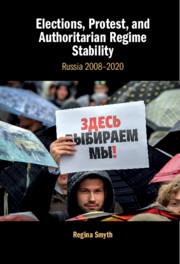Book contents
- Elections, Protest, and Authoritarian Regime Stability
- Elections, Protest, and Authoritarian Regime Stability
- Copyright page
- Dedication
- Contents
- Figures and Tables
- Acknowledgments
- 1 Elections, Protest, and Regime Dynamics
- 2 Winning Elections
- 3 The Long Game
- 4 The Unexpected Power of Weak Opposition
- 5 The Vote Protest
- 6 The Polls Close and Two Movements Emerge
- 7 Protest and Rally Dynamics
- 8 The Perpetual Campaign
- 9 2018–2020
- Book part
- References
- Index
9 - 2018–2020
Competition and Contestation
Published online by Cambridge University Press: 16 October 2020
- Elections, Protest, and Authoritarian Regime Stability
- Elections, Protest, and Authoritarian Regime Stability
- Copyright page
- Dedication
- Contents
- Figures and Tables
- Acknowledgments
- 1 Elections, Protest, and Regime Dynamics
- 2 Winning Elections
- 3 The Long Game
- 4 The Unexpected Power of Weak Opposition
- 5 The Vote Protest
- 6 The Polls Close and Two Movements Emerge
- 7 Protest and Rally Dynamics
- 8 The Perpetual Campaign
- 9 2018–2020
- Book part
- References
- Index
Summary
This chapter places recent events in the context of the theoretic framework. In 2024, President Putin and his government face the same challenge that it faced in 2008. Constitutional term limits mandate that Putin leave office, prompting broad speculation about its effect on the 2021 parliamentary elections and the presidential race. Consistent with the formal model, the regime banned the opposition in Moscow’s 2019 municipal elections and the opposition unified to send a protest signal. Popular response kicked off some of the largest protests in recent years. In response, the Kremlin increased the use of repression against protesters, a move that provided new information about the regime type. Voters carried the protest into the voting booth and sent a strong signal in support of opposition candidates. In addition, the Kremlin moved to manage the next national election cycle by instituting signification constitutional reform and launching new social welfare programs. The final section of the chapter highlights the contributions of the study for comparative politics and Russia regional studies.
Keywords
- Type
- Chapter
- Information
- Elections, Protest, and Authoritarian Regime StabilityRussia 2008–2020, pp. 204 - 223Publisher: Cambridge University PressPrint publication year: 2020



